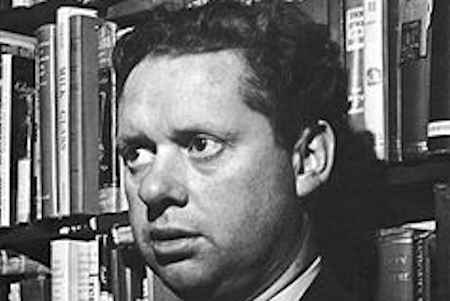
Dylan Thomas died in New York on 9 November 1953
Dr Chris Williams is the Research and Knowledge Exchange Impact Officer for the University’s Faculty of Humanities and Social Sciences.
“To misquote awkwardly, it was his sixtieth year in heaven that academia seemed to wake to hearing Dylan Thomas the poet in a year’s turning. I use the description of ‘the poet’ deliberately, as in this centenary year, it seems that critical opinion has started to remember the wonder and power of Dylan’s written verse. The rest of the world never forgot.
It may seem strange, but Dylan Thomas’s successes in numerous literary and performance fields, coupled with some salacious biographies, have been detrimental to his core reputation amongst other writers and academics.
Difficult to label
His writing was never easy to pigeonhole, with various attempts to force his round body into the square holes of surrealist, new apocalyptic, neo-romantic, pastoral traditions or the undefined ‘nature poet’ or ‘Welsh poet’ doomed to failure, so perhaps critics didn’t know the best direction to aim their disapproval from?
If you anonymised some of his best known poems, say ‘Among Those Killed in the Dawn Raid Was a Man Aged a Hundred’, ‘Fern Hill’, ‘Altarwise By Owl-Light’, ‘In My Craft Or Sullen Art’ and ‘Do Not Go Gentle Into That Good Night’ it would be difficult to label the five works as one distinct style, though are all quintessentially and recognisably ‘Thomas’.
From the sixties onwards, what amounted to a blanket of high profile vitriol and negativity championed by Kingsley Amis (who bizarrely ended up a trustee of the Dylan Thomas literary estate) led to a situation where for many years there was barely any serious literary criticism or analysis of one of the best known and best loved poets of the twentieth century.
Popular appeal
Again I use the descriptions advisedly, as outside the realms of poets and critical study, in the second half of the twentieth century Dylan was one of the few poets whose name was known (and with affection) by the general public.
Aside from the poems themselves, stories like ‘A Child’s Christmas in Wales’, broadcasts like ‘Quite Early One Morning’ and the currently ubiquitous ‘Under Milk Wood’ remained hugely popular; ‘Do Not Go Gentle Into That Good Night’ was referenced in everything from newspaper headlines to a Frankie Goes to Hollywood top ten single, and the (inaccurate) famous last words ‘I’ve had eighteen straight whiskies, I think that’s a record’ stayed in the public consciousness, along with the image of the ‘first pop star poet’. Dylan the icon rubbed shoulders with Jim Morrison and Sid Vicious in some quarters, Rimbaud and Swinburne in others.
Artistic appeal
And across the years, other artistic forms recognised and celebrated Thomas. Ceri Richards, Peter Blake and Ralph Steadman all flew the flag in the art world (along with Steve Dillon in a graphic novel), composers and performers as diverse as Stravinsky, John Cale, Stan Tracy, Ralph McTell (and currently Cerys Matthews) produced full length works dedicated to his life and poetry, ‘Under Milk Wood’ has had several high profile and celebrity packed versions released, and film has done its part with his original scripts for ‘The Doctor and the Devils’ and ‘Rebecca’s Daughters’ brought to the screen with stars like Timothy Dalton, Peter O’Toole and Joely Richardson starring.
New film
A new biopic starring Elijah Wood, ‘Set Fire to the Stars’, is released at cinemas this week. There has been a dvd release of some of Thomas’s documentary films, and several collections of his letters and radio broadcasts published. Dylan’s audio recordings have been selected dozens of times on ‘Desert Island Discs’ and his early records for Caedmon essentially launched the modern spoken word market. I could go on. Easily. And I often do.
The one area Dylan Thomas hasn’t been truly appreciated as he deserves though, is in the one thing he loved most and did best, his poetry. And this omission has been at the hands of those who should in theory be best placed to recognise his literary worth, academics and fellow poets. I’m glad to say this is changing, and this is helped hugely by John Goodby’s recent book ‘Under The Spelling Wall’.
Hopefully the renaissance of Dylan Thomas as a major poet worthy of study will continue and his praises will still be sung/ On this high hill in a year’s turning.”
